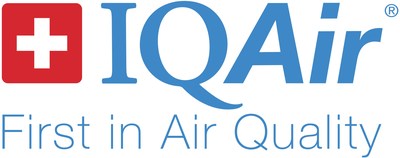 |
| Representation Image |
Findings Underscore Role Human Behavior Plays in Air Pollution
GOLDACH, Switzerland, March 16, 2021 /PRNewswire/ -- New data from IQAir's global air quality data platform, published in the 2020 World Air Quality Report and an online interactive global map, reveals the impact of COVID-19 lockdowns and behavioral changes on global particulate pollution (PM2.5) levels.
Key findings:
- COVID-19 impact: In 2020, 84% of all monitored countries observed air quality improvements, largely due to global measures to slow the spread of COVID-19.
- Air quality improvements across major cities in 2020 compared to 2019 include Beijing (-11%), Chicago (-13%), Delhi (-15%), London (-16%), Paris (-17%) and Seoul (-16%).
- Only 24 out of 106 monitored countries met World Health Organization (WHO) annual guidelines for PM2.5 in 2020.
- Climate change continues to affect air quality: The year 2020 is tied with 2016 as the hottest year on record. Wildfires and sandstorms fueled by the warming climate led to extremely high pollution levels in California, South America, Siberia and Australia.
- India: In 2020, all Indian cities monitored observed air quality improvements compared to 2018, while 63% saw improvements compared with 2019. However, India continues to feature prominently at the top of the most polluted cities ranking, with 22 of the top 30 most polluted cities globally.
- China: In 2020, 86% of the cities in China experienced cleaner air than the previous year. Despite this, Chinese residents are still exposed to PM2.5 levels more than 3 times the WHO annual guidelines. Hotan in northwestern China ranks as the world's most polluted city, largely due to sandstorms exacerbated by climate change.
- United States: Average particle pollution levels rose by 6.7% in 2020, despite measures to contain the spread of COVID-19. Record-breaking wildfires in California, Oregon and Washington caused U.S. cities to comprise 77 of the world's top 100 most polluted cities in September 2020 (by monthly PM2.5 average). In 2020, 38% of American cities did not meet the WHO's guideline for annual PM2.5 levels. This is a significant uptick from the 21% of U.S. cities that did not meet the WHO guidelines in 2019.
- South Asia: South Asia is the most polluted region of the world with Bangladesh, India and Pakistan sharing 42 of the 50 most polluted cities worldwide.
- Europe: In 2020, about half of all European cities exceed the WHO's target for annual PM2.5 pollution. The highest levels of PM2.5 pollution was found in Eastern and Southern Europe, with Bosnia Herzegovina, North Macedonia and Bulgaria taking the lead.
"The year 2020 brought an unexpected dip in air pollution. In 2021, we will likely see an increase in air pollution due to human activity, again," said Frank Hammes, CEO of IQAir. "We hope this report will highlight that urgent action is both possible and necessary to combat air pollution, which remains the world's greatest environmental health threat."
"While many cities recorded temporary improvements in air quality due to lockdowns, the health impact of burning fossil fuels remained severe. Unfortunately, Delhi continued to be the most polluted capital city in the world in 2020. To see real, long-term improvements in air quality, governments must prioritize clean energy sources such as wind and solar and promote low cost, carbon neutral and accessible transport. Speeding up the transition to clean energy and clean transport not only saves lives, but also dramatically reduces healthcare-related costs," said Avinash Chanchal, Climate Campaigner, Greenpeace India.
"Many parts of the world experienced unprecedented, but short-lived, improvements in air quality in 2020, as restrictions related to the COVID-19 pandemic caused a steep drop in fossil fuel consumption," said Lauri Myllyvirta, lead analyst at the Centre for Research on Energy and Clean Air (CREA), who also contributed to the report. "This improved air quality meant tens of thousands of avoided deaths from air pollution. By transitioning to clean energy and clean transport we can realize the same improvements in a sustained way."
About the World Air Quality Report
The 2020 World Air Quality Report is based on PM2.5 data from 106 countries, that has been measured by ground-based monitoring stations. Of the data sources included in this report, 66.6% of stations were operated by governmental agencies, while the remainder represent monitoring stations managed by local residents, non-profit organizations and companies.
Interactive Map
About IQAir
IQAir is a Swiss-based air quality technology company that since 1963 seeks to empower individuals, organizations and communities to breathe cleaner air through information, collaboration and technology solutions.









 IndianWeb2.com is an independent digital media platform for business, entrepreneurship, science, technology, startups, gadgets and climate change news & reviews.
IndianWeb2.com is an independent digital media platform for business, entrepreneurship, science, technology, startups, gadgets and climate change news & reviews.
ليست هناك تعليقات
إرسال تعليق